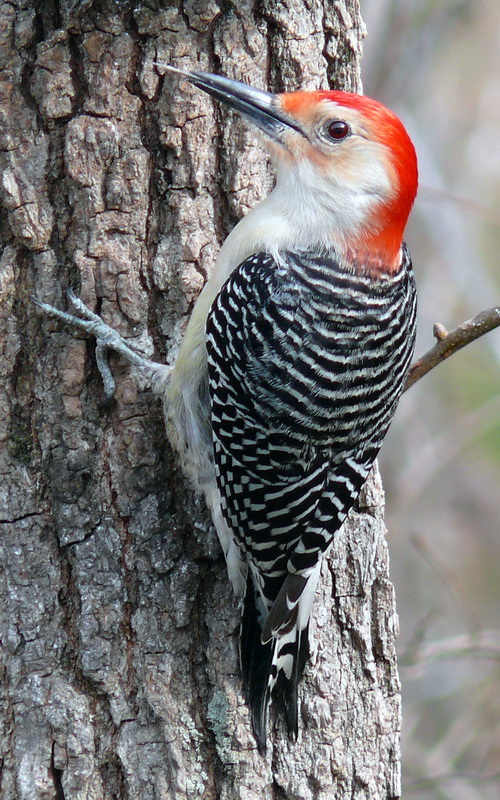Red-bellied Woodpecker
From Wikipedia, the free encyclopedia
[Photo] A male Red-bellied Woodpecker (Melanerpes carolinus). Photo taken with a Panasonic Lumix DMC-FZ50 in Johnston County, North Carolina, USA. Date 4:52PM EST 16FEB07. Author Ken Thomas http://www.kenthomas.us
The Red-bellied Woodpecker, Melanerpes carolinus, is a medium-sized woodpecker of the Picidae family.
Adults are mainly light grey on the face and underparts; they have black and white barred patterns on their back, wings and tail. Adult males have a red cap going from the bill to the nape; females have a red patch on the nape and another above the bill. The reddish tinge on the belly that gives the bird its name is difficult to see in field identification. They are 9 to 10.5 inches long, and have a wingspan of 15 to 18 inches. These birds search out insects on tree trunks. They may also catch insects in flight. They are omnivores, eating insects, fruits, nuts and seeds.
Habitat
Their breeding habitat is usually deciduous forests in southern Canada and the northeastern United States, however they may range as far south as Florida and as far west as Texas. They nest in the decayed cavities of dead trees, old stumps, or in live trees that have softer wood such as elms, maples, or willows; both sexes assist in digging nesting cavities.
Calls
Red-bellied woodpeckers are noisy birds, and have many varies calls. Calls have been described as sounding like "churr-churr-churr" or "chuf-chuf-chuf" with an alternating "br-r-r-r-t" sound. Males tend to call and drum more frequently than females, but both sexes call.
Interesting Red-bellied Woodpecker Facts
Red-bellied woodpeckers "drum" to attract mates. They tap on aluminum roofs, metal guttering, hollow trees and even transformer boxes, in urban environments, to communicate with potential partners. Their sounds can cause dismay to a person who wishes to sleep peacefully at night, but can it easy for birdwatchers to locate specimens.
http://en.wikipedia.org/wiki/Red-bellied_Woodpecker
| The text in this page is based on the copyrighted Wikipedia article shown in above URL. It is used under the GNU Free Documentation License. You may redistribute it, verbatim or modified, providing that you comply with the terms of the GFDL. |
|

